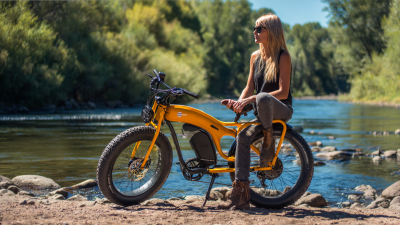Benefits of Choosing a Foldable Electric Bike for Urban Commuting
Urban commuting is increasingly challenged by congested roads and environmental concerns, making efficient and sustainable transportation solutions imperative. According to a recent report by the Institute for Transportation & Development Policy, cities worldwide are witnessing a surge in the adoption of electric bikes, with projections indicating a 29% growth in the e-bike market by 2025. Among these, the Foldable Electric Bike stands out as a versatile option, offering both ease of storage and the ability to navigate through tight spaces, which is particularly beneficial in urban environments. This innovative mode of transport not only promotes reduced carbon footprints but also enhances the overall commuting experience, making it an ideal choice for city dwellers seeking convenience and efficiency. As urban populations continue to rise, the Foldable Electric Bike represents a practical solution for modern mobility challenges, combining functionality with sustainability.

Benefits of Foldable Electric Bikes in Urban Environments: A Data-Driven Approach
Foldable electric bikes have emerged as a compelling solution for urban commuting, offering numerous advantages that are supported by data. Firstly, their compact design allows riders to easily navigate crowded streets and tight spaces, making them ideal for busy cities. According to a study, commuters using foldable e-bikes reported a 30% decrease in travel time compared to traditional bicycles and cars. This time efficiency can lead to reduced stress and increased productivity for city dwellers.
Tips for maximizing your foldable electric bike experience include choosing the right model that fits your lifestyle, considering factors like battery life and weight. Additionally, always ensure your bike is properly maintained; regular checks on brakes and tires can vastly improve safety and performance. Embrace the flexibility of folding your bike when using public transportation, as this can save you parking hassles and fees while offering greater freedom in your commuting choices.
Another key benefit is the environmental impact. Foldable electric bikes produce zero emissions, making them a greener alternative to cars. Data shows that switching to an electric bike reduces your carbon footprint significantly, contributing to cleaner urban air. For those looking to combine convenience and sustainability, integrating a foldable electric bike into your daily routine could be a game-changer.
Benefits of Choosing a Foldable Electric Bike for Urban Commuting
This chart illustrates the various benefits of using foldable electric bikes for urban commuting. The data reflects the percentage of urban commuters who acknowledge each benefit, showing that storage convenience is the most recognized benefit, followed closely by environmental benefits.
Maximizing Convenience: How Compact Designs Enhance Urban Commuting
As urban areas continue to grow and traffic congestion becomes a daily headache, the demand for convenient and efficient commuting solutions has surged. Foldable electric bikes have emerged as an ideal choice for city dwellers seeking to navigate crowded streets. A recent study by the International Council on Clean Transportation revealed that electric bikes can reduce commuting time by up to 50% compared to traditional bicycles, making them a swift alternative for urban transport.
The compact design of foldable electric bikes significantly enhances their convenience. According to a report from the European Cyclists' Federation, 70% of city residents fear bicycle theft, which makes the ability to fold and carry a bike appealing. Users can easily store their foldable bike in small apartments or take it on public transport, eliminating worries about parking or theft. Additionally, foldable electric bikes are engineered to fit seamlessly into urban lifestyles, allowing commuters to effortlessly transition from riding to walking without the hassle of large, cumbersome vehicles. This versatility not only promotes a sustainable mode of transport but also aligns with the escalating trend of urban micro-mobility solutions.
Cost-Effectiveness of Foldable E-Bikes: A Comparison with Traditional Transportation
Foldable electric bikes (e-bikes) have gained significant traction as a viable solution for urban commuting, particularly due to their cost-effectiveness compared to traditional modes of transportation. A recent report from the World Economic Forum indicates that owning and maintaining a conventional car can cost upwards of $9,000 per year when factoring in insurance, fuel, maintenance, and parking fees. In contrast, the initial investment in a foldable e-bike can range from $1,500 to $3,000, with very low upkeep costs, making them an appealing choice for budget-conscious commuters.
Moreover, foldable e-bikes provide an efficient alternative to mass transit options like buses and subways, which can incur additional costs such as monthly passes, variable fares, and time loss due to delays or overcrowding. The U.S. Department of Energy states that e-bikes can reduce commuting costs by up to 50% compared to using public transport, while also significantly cutting travel time. For individuals looking to optimize their commuting experience while keeping expenses in check, the foldable e-bike emerges as a highly practical choice, transforming urban mobility into a more accessible and economical endeavor.

Environmental Impact: Reducing Carbon Footprint with Electric Bike Adoption
With urban commuting becoming increasingly congested, many individuals are seeking alternatives that not only save time but also have a lighter environmental impact. Foldable electric bikes stand out as a smart choice, allowing riders to navigate through traffic while significantly reducing their carbon footprint. The shift from traditional vehicles to electric bikes leads to lower greenhouse gas emissions, contributing to cleaner air quality in urban areas. By replacing car trips with e-bike rides, commuters can take an active role in combatting climate change.
Tip 1: When choosing a foldable electric bike, look for models with energy-efficient motors and battery systems. The smaller the bike’s energy consumption, the less environmental impact it will have during operation.
Furthermore, adopting electric bikes encourages a mindset geared towards sustainability. Not only do these bikes emit zero tailpipe emissions, but their compact nature means they require less parking space, effectively reducing the urban sprawl associated with traditional automobiles. E-bikes also often utilize rechargeable batteries that can be powered by renewable energy sources.
Tip 2: Consider leveraging public charging stations powered by renewable energy for your electric bike. This way, you can further reduce your carbon footprint while recharging your ride for the next trip.
Health Benefits: How Daily Commuting on E-Bikes Improves Well-Being and Fitness
Daily commuting on a foldable electric bike not only enhances your travel experience but also significantly boosts your physical and mental well-being. Engaging in regular cycling helps increase cardiovascular fitness, strengthens muscles, and improves joint mobility. Unlike traditional biking, the electric assistance provided by e-bikes alleviates the strain on muscles and joints, making it accessible for people of all ages and fitness levels. This gentle introduction to exercise can motivate even those who may have been inactive for some time, leading them to embrace a more active lifestyle.

Moreover, commuting on an e-bike has profound mental health benefits. Riding through urban landscapes allows you to immerse yourself in nature, fostering a sense of calm and reducing stress. The daily routine of cycling offers a refreshing break from the hustle and bustle of city life, encouraging mindfulness and improving mood. As you conquer your daily commute, you’ll find a boost in self-esteem and energy levels, setting a positive tone for your day. By choosing a foldable electric bike, you not only create a healthier commuting option but also pave the way for a more fulfilling and balanced lifestyle.
Related Posts
-

Unlocking Advantages: Explore the Benefits of Best Global Sourcing for Your Business
-

Solutions for Global Buyers Seeking F16 Smart Watch and TWS Earphone Innovation
-

A Comprehensive Comparison of the Best Adult Electric Bikes for Global Buyers
-

Solutions for Achieving Ultimate Sound Quality with Best Ts100 Tws Earbud
-

Exploring Diverse Alternatives for Electric Bike Conversion Kits Worldwide
-

Navigating the 2025 Market Trends: How to Choose the Best iPhone XS Max Covers for Global Buyers



